Python programming language is applied in so many areas of computer technology, i.e., Scripting, GUI development, Website development, Artificial Intelligence (AI), Machine Learning, Data Science, Computer Networking, and Network Automation, and Cyber Security.
We have many integrated development environment Python IDEs’ in the market today. All have different qualities and features. For example, some specifically run on Linux systems. Others are Windows-based, while others are cross-platform and can run on both Operating Systems. In this post, we are going to look at Python IDEs’ for Linux systems.
Best Python IDEs for Linux
1. IDLE
It comes top of the list because its the standard Python Development Environment. IDLE is an acronym for Integrated DeveLopment Environment. It’s a cross-platform application available for both Linux and Windows systems.
It is a simple IDE containing all the features needed to have Python running on your system. It is written in Python using the Tkinter library and highly recommended for Python beginners.
Features:
- Syntax highlighting in your Python code
- Autocomplete feature
- Automatic indentation for your code
- Multi-window text editor support
- An Integrated Python debugger
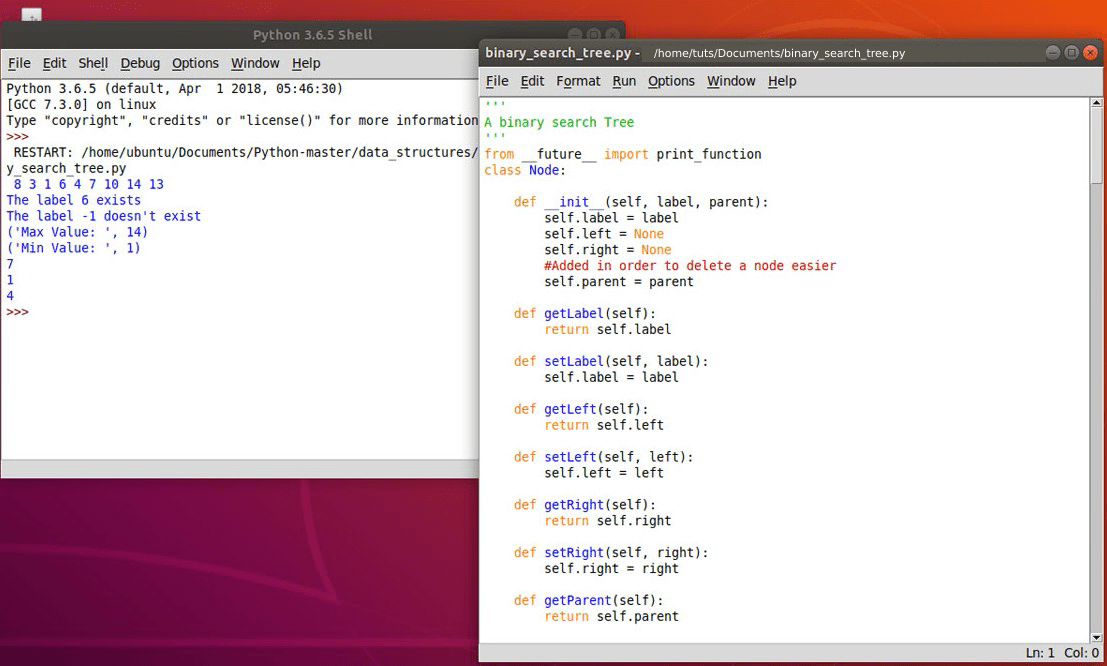
Python IDLE
2. PyCharm
Pycharm is a free, powerful, cross-platform Python IDE highly customizable. Commonly referred to as “all in one package,” it comes with many inbuilt tools and features necessary for your Python development.
Features:
- Code syntax and error highlighting
- An integrated Python debugger
- Easy and efficient code navigation. One can easily navigate between project files, classes, methods, etc.
- Google App engine python development
- Supports for various Python libraries like matplotlib, NumPy, and scipy
- Supports for the common Python web frameworks; Django, Flask, and web2py
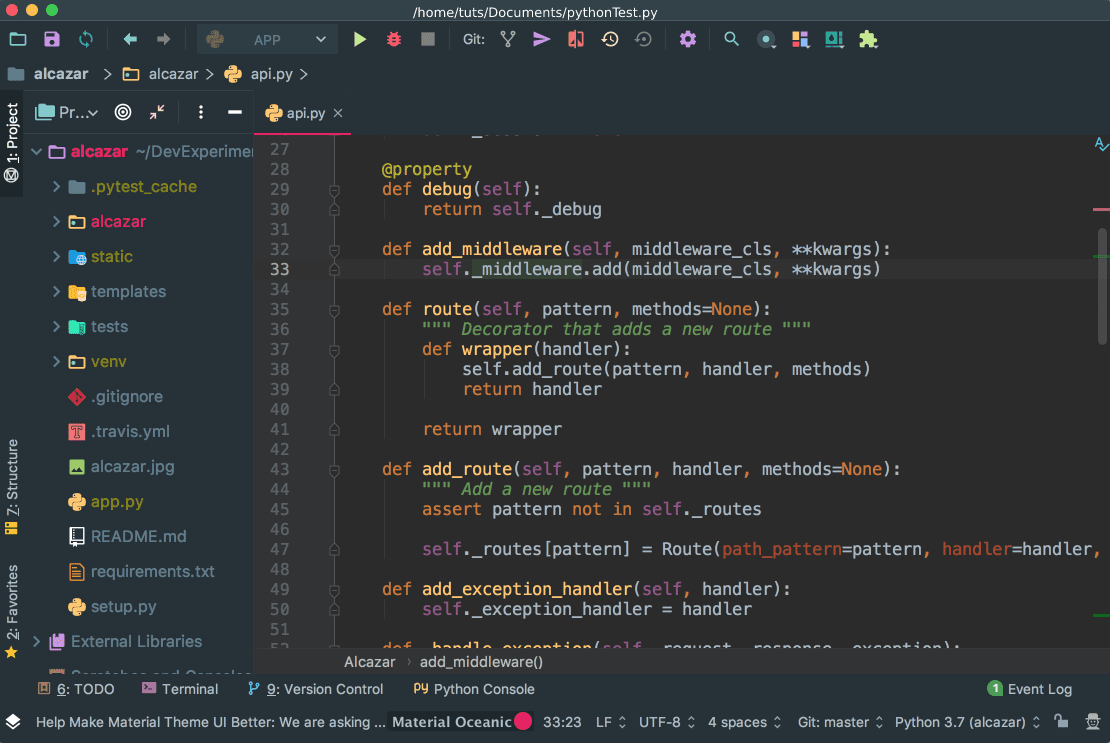
Pycharm IDE
3. VS Code
Visual Studio Code or VS Code is a cross-platform editor for Windows, Linux, and macOS. Developed by Microsoft, VS Code supports a variety of programming languages. All you need is to install the extension for the programming language of choice.
It is highly customizable, and developers can create their shortcut keys, change the theme, and customize preferences. To get started with VS Code for Python, install the Python-extension to activate support for Python development. Note, Visual Studio Code IDE should not be confused with Microsoft Visual Studio.
Features:
- It offers support for different python modules. For example, if you are working with NumPy, you can install a particular extension
- It comes with a built-in command line to run your code
- The integrated GIT enables one to push, pull, or commit changes to GitHub projects
- It supports a live share feature that allows one to run the debugger remotely
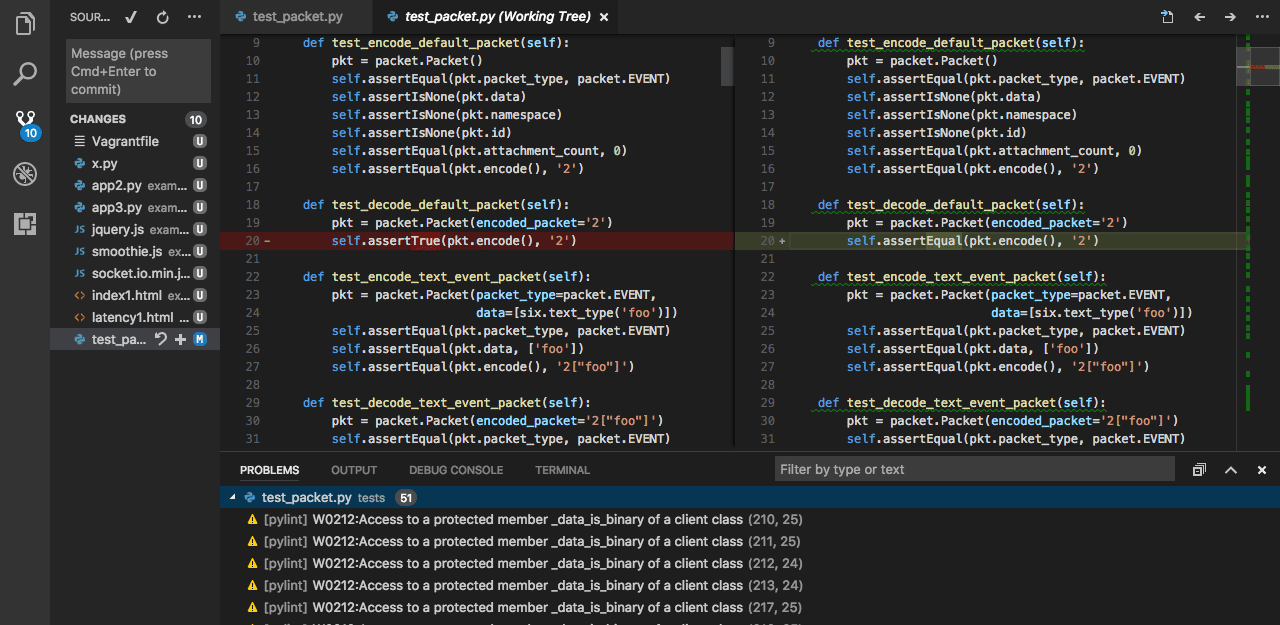
Visual Studio Code
4. Wing Python IDE
Wing is a Linux Python developed by Wingware. It a powerful and lightweight IDE designed for debugging, testing, and speed up writing of Python code. Wing IDE comes in three versions; Wing 101, Wing Personal, and Wing Pro.
Just like the names suggests, these versions differ in terms of features and support.
- Wing 101 is for Python beginners
- Wing Personal is for students and general Python enthusiasts
- Wing Pro is a commercial package for professional Python programmers
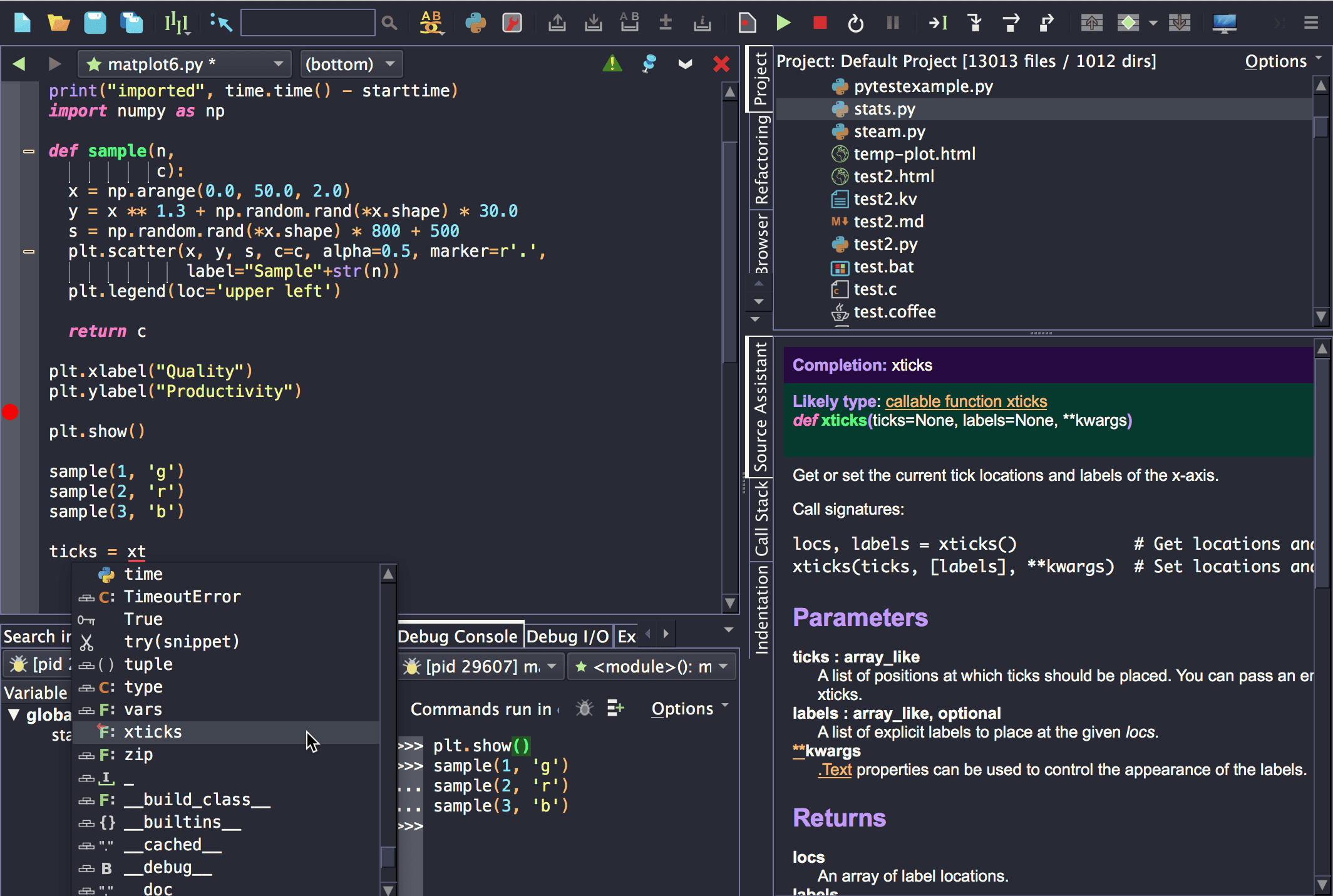
Wing IDE
Features:
Note, these features vary from the different Wing packages with Wing pro having the best and most powerful features.
- It comes with intelligence to monitor code syntax, errors, and indentation.
- It is highly customizable, and developers can create shortcut keys and customize the preferences set.
- It comes with a powerful debugger that can be launched within or outside the IDE.
- It contains an extensive collection of various Python libraries and modules like; PyQt, Numpy, Flask, Google App Engine, Django, and many more.
- It supports remote code debugging and excellent code navigation.
5. Eric Python IDE
It is a Python editor that comes integrated with many features. It is written in Python using the QT User Interface (UI) library. It’s an open-source and cross-platform application that supports a variety of languages.
It runs on Windows, Linux, and macOS. It comes with all the necessary tools required for a stable Python development environment.
Features:
- Support for source code editing. Here, we have features like; several code editors, code autocomplete, syntax and error highlighting, brace matching, code folding, customizable window layout, reliable search functionality, and many more.
- It supports GUI design and development. One can integrate the QT designer, which is a graphical front-end builder for the QT library.
- An integrated Python debugger.
- Support for Python Django framework.
- It contains project management and collaboration tools—for example, an automatic updating to-do-list, a chat forum, and a shared code editor.
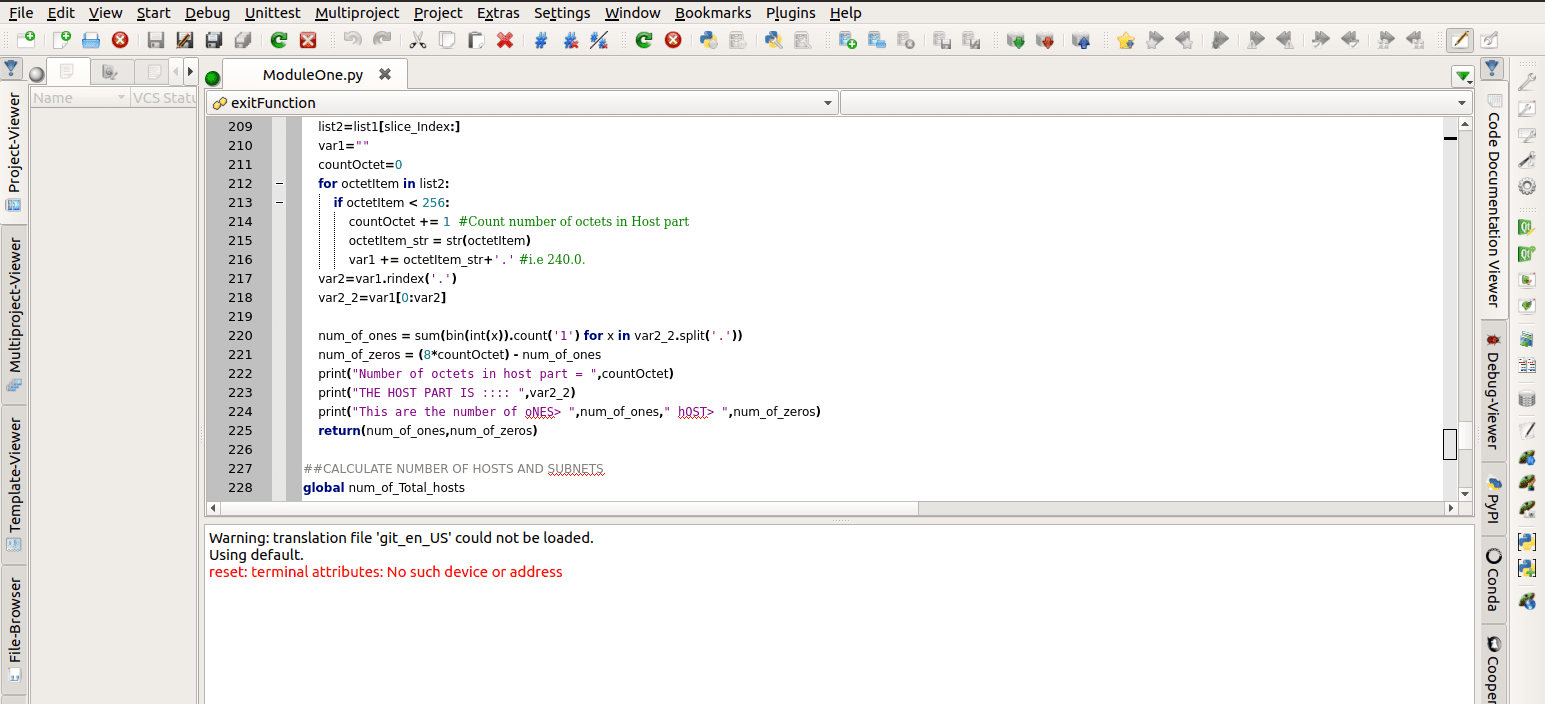
Eric Python IDE
6. PyDev
It is a third-party plugin for the Eclipse Integrated Development Environment. It is a powerful extension that supports development with Python.
Features:
- Support for code-autocompletion, making it faster to write code.
- Code analysis feature that tries to fix any arising problems in the code.
- It comes with a powerful Python debugger, which can be executed remotely.
- Support for the Django framework.
- Support code management features like; syntax analysis, smart indentation, and code folding.
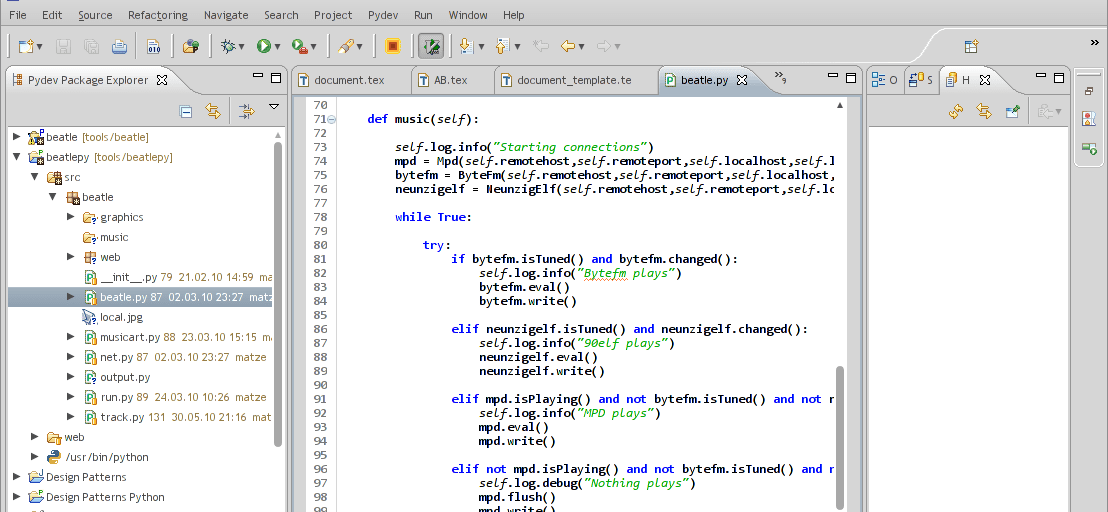
PyDev Python IDE
7. Spyder
It is opensource and is used in scientific development. Spyder is a cross-platform tool that runs in macOS, Windows, and Linux systems. It includes some of the powerful packages used for scientific development in Python, i.e., Matplotlib, Numpy, Pandas, Scipy, IPython, Cython, SymPy, and many more.
Features:
- A powerful code editor with features like syntax highlighting, code auto-completion, and introspection.
- A file explorer extension that helps you to manage your projects.
- It gives one ability to edit and interact directly with variables from a Graphical User Interface (GUI).
- It comes with a debugger that supports step by step execution.
- Support for the use of multiple IPython consoles to check code
- It supports the use of various plugins to perform particular tasks, e.g., Spyder-Unittest, Spyder-Reports, and many more.
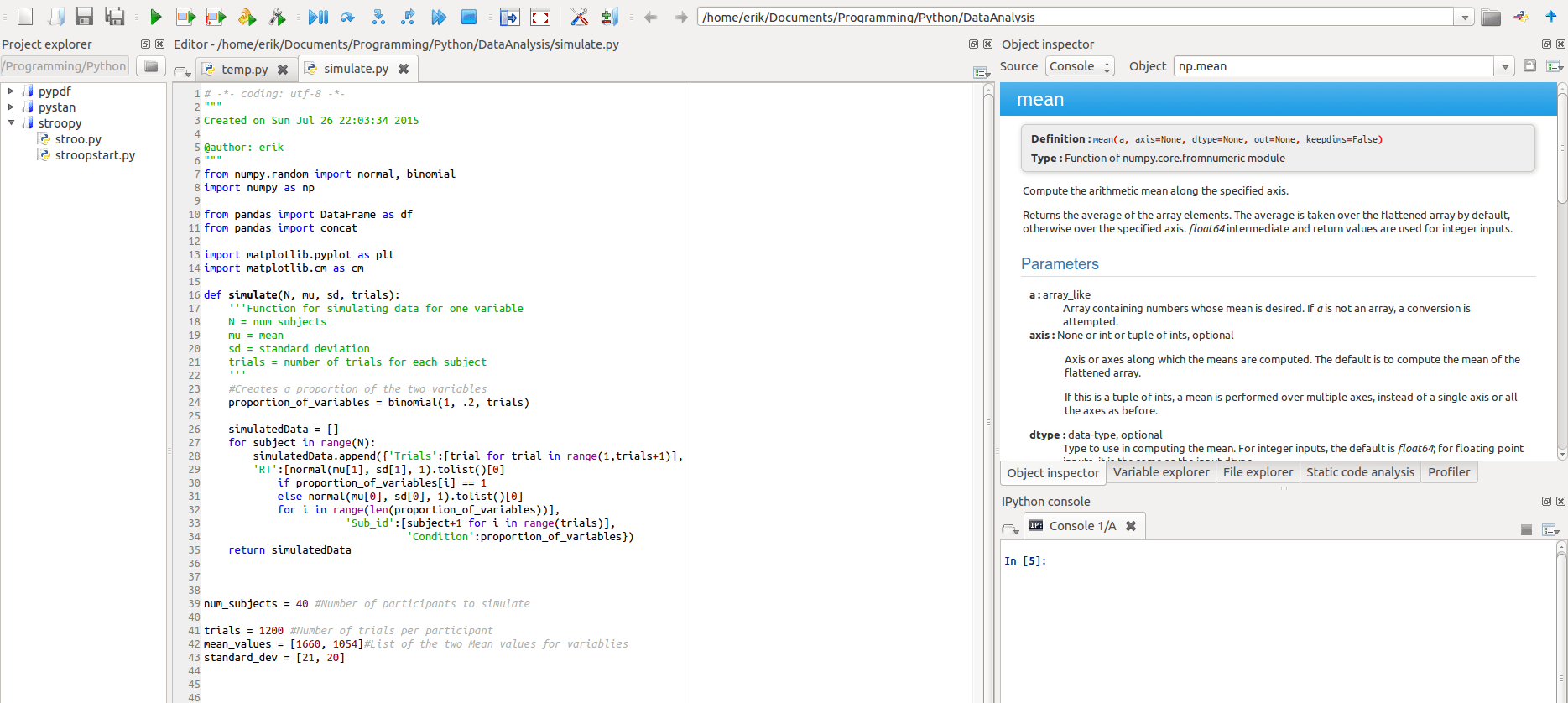
Spyder Python IDE
8. Pyzo
Pyzo is an opensource integrated development environment for Python. It supports Conda for easy package management. For Matlab users, Pyzo can be seen as a free alternative.
Earlier versions of Pyzo were distributed as an environment and a scientific development platform (Conda). Nowadays, Pyzo is released purely as an IDE, and you will have to install the Anaconda package yourself. Nevertheless, it is a simple and powerful system that even beginners can easily navigate through different tools.
Features:
- Supports code autocompletion
- It’s a cross-platform tool that runs on Windows, macOS, and Linux distros.
- Supports bracket matching, which is useful for a large piece of code.
- It comes with a powerful integrated debugger.
- It works without the necessity of a Python interpreter.
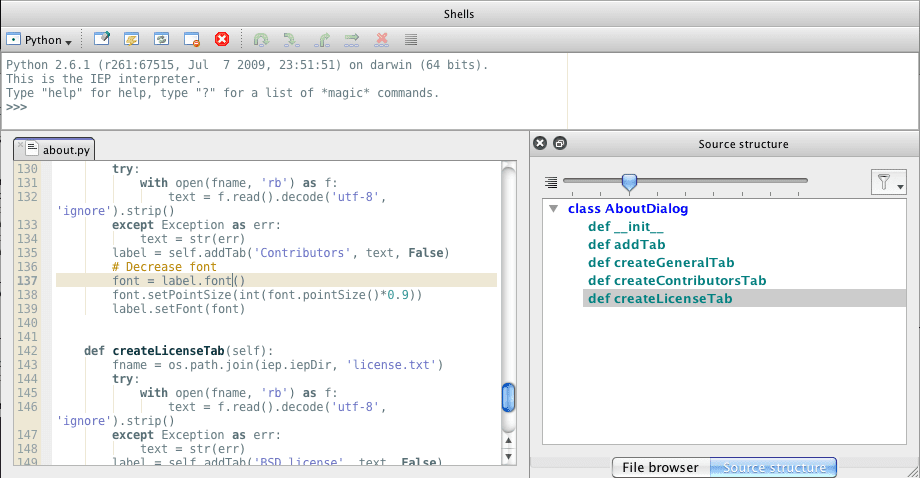
Pyzo Python IDE
9. GNU Emacs
It is an open-source, cross-platform customizable text editor with support for different programming languages. It comes with a “Python Mode” feature that allows you to develop using Python.
Features:
- It highlights variables and constants differently with the Python keywords.
- It supports bracket matching for statements like if, elif, for-loop, while-loop and, many more.
- It supports smart indentation as required in Python.
- It supports thousands of commands to use on its interface. Developers can also create their commands for different tasks.
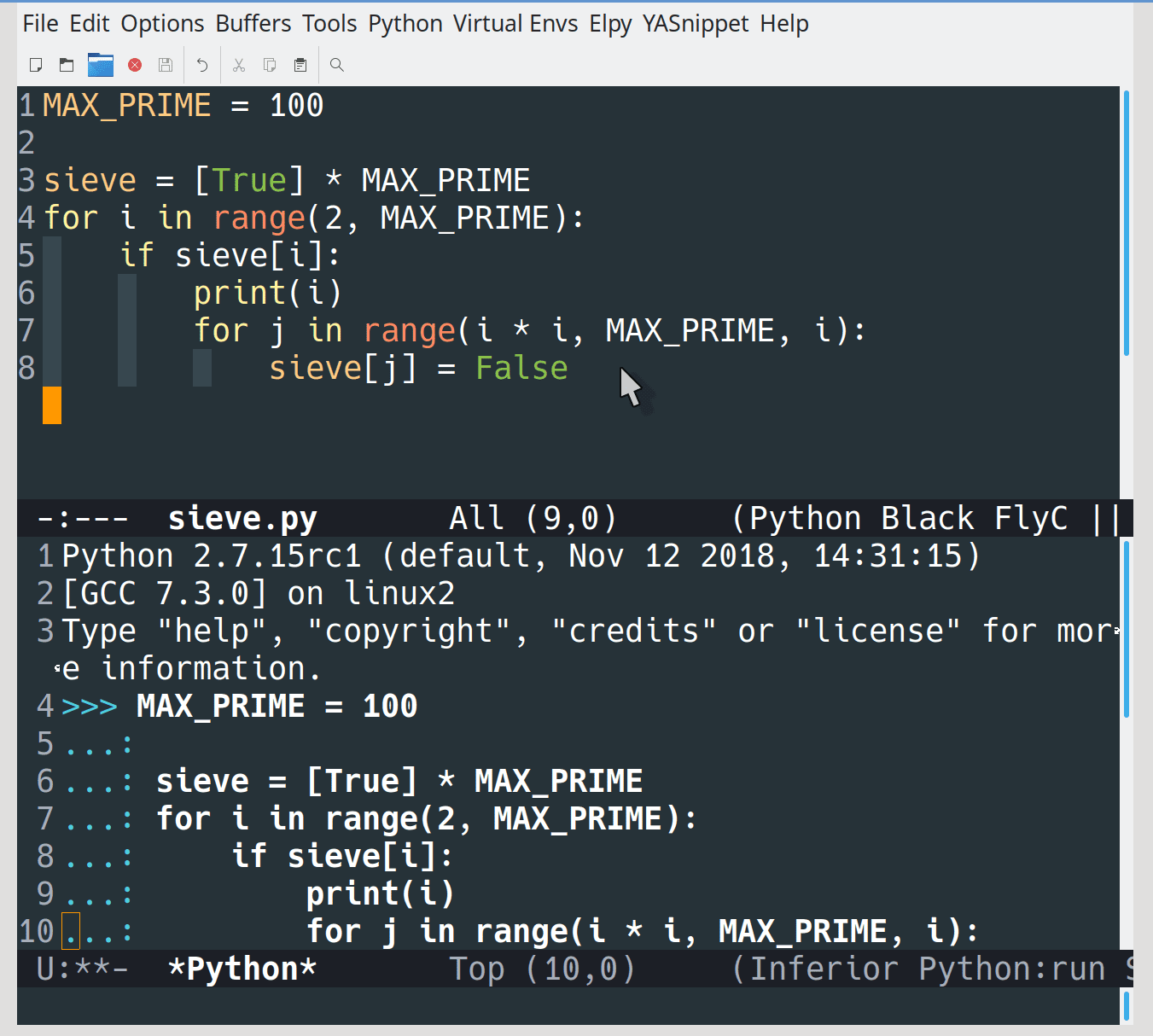
GNU Emacs Python IDE
10. KDevelop
It is a free, opensource and cross-platform IDE that runs on macOS, Linux, and Windows. It supports a variety of features like debugging, editing, and code navigation for different programming languages.
Kdevelop comes with inbuilt parsers for languages like C, C++, Javascript, Objective-C and, OpenCL. It supports plugins for Python, Ruby, Perl, and many more.
Features:
- It comes with a powerful text editor that supports code autocompletion, syntax highlighting, and smart indentation.
- Support for GUI development. It comes integrated with the PYQT designer, which is a front-end tool for the Python Qt library.
- It supports easy project management techniques using tools like Cmake, Automake, Qmake for Qt library, etc.
- Highlight variables and constants different from Python inbuilt keywords.
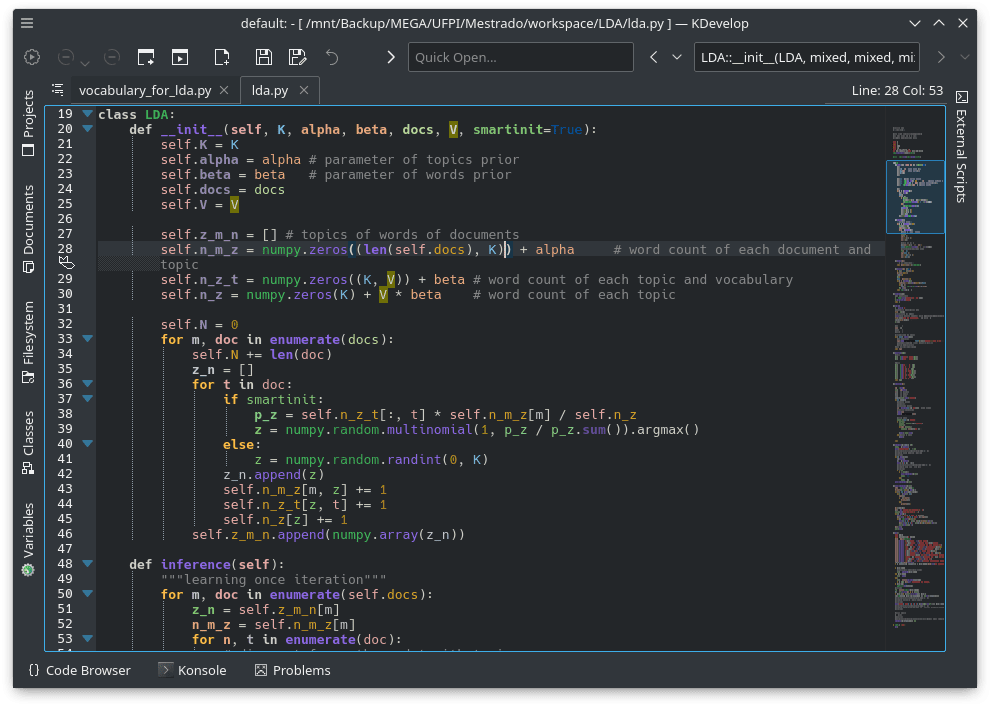
KDevelop Python IDE
11. Atom
Atom is an opensource text editor for macOS, Windows and, Linux. It supports plugin for different languages written in NodeJSand embedded Git control. Git Hub develops the latter.
To run Python in Atom, you will need to install “script” from package control. You can also add additional tools like Hydrogen, which gives you more capabilities with Python development.
Features:
- Code auto-completion and syntax highlighting
- Support for smart indentation needed in Python programming.
- It supports different highlighting colors for user variables and inbuilt Python keywords.
- It is highly customizable, and one can install different packages as they wish.
- Support for Jupyter Notebook integration using the Hydrogen package.

Atom IDE
Conclusion
Choosing a Python IDE depends on users’ needs for the project they are working on. For example, a simple text editor is useful for writing Python scripts, but for a scientific project, you need a much more complex one. Some of these support the plugin integration of different Code management tools like PMD. You can read our article on PMD.
Which is your favorite one, and why do you like it? Or did we miss your IDE? Please, leave us a comment below in the comment section.


5 comments
Hi!
The IDLE download link does not point to the right site.
You should to fix that.
Cheers
Thanks for highlighting it. It’s fixed now.
I thought VS Code was classified as a code editor and not an IDE?
the link for IDLE takes me to pencil2d animation
Thanks for highlighting it. It’s fixed now.